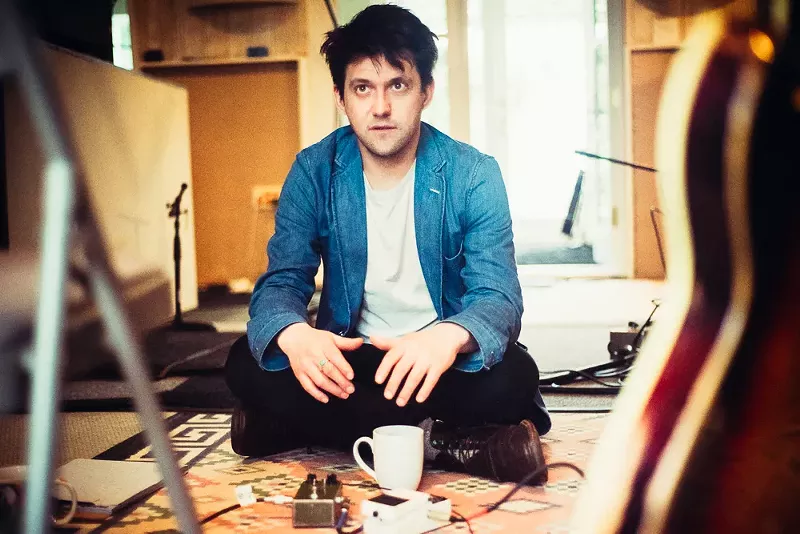
Audio By Carbonatix
[
{
"name": "GPT - Leaderboard - Inline - Content",
"component": "35519556",
"insertPoint": "5th",
"startingPoint": "3",
"requiredCountToDisplay": "3",
"maxInsertions": 100,
"adList": [
{
"adPreset": "LeaderboardInline"
}
]
}
]

As we age, the average number of fucks given declines precipitously. Frustrating as this can be for friends and family, it has tremendous benefits for musicians increasingly willing to say, "why the hell not?" In this case, it's Conor Oberst throwing his hands in the air like he just don't care with his new album, Salutations, the more fleshed-out version of his austere October release, Ruminations.
"It is a bit of a déjà vu I guess," Oberst admits by phone from a tour stop in El Paso. "But it was sort of intended that way."
Oberst was halfway through recording Salutations when the head of his label Nonesuch fell hard for the album's demos. The songs' spare accompaniment amplified the bare-wire emotions making every vocal creak, lyrical hesitation and anguished acoustic downstroke feel like a knife to the ribs.
Then there's the tone of betrayal, world-weary ache, and references to Stockholm Syndrome which evoke the very public rape accusation against Oberst three years ago, and the woman's subsequent retraction, confessing she did it for attention.
Recorded back home in Omaha, Neb., where Oberst retreated after more than a decade in New York, Ruminations recalls the unvarnished power of Springsteen's Nebraska, with a similarly striking simplicity and depth. While Oberst always intended to record the full band album — with buddies the Felice Brothers and renowned session drummer Jim Keltner (who has worked with Bob Dylan, Richard Thompson, Neil Young, Brian Wilson) — the idea of releasing the demos first intrigued him.
"It seemed like an interesting thing for people to kind of hear the songs in their most base form... [because] usually you put out a record and later down the road there's the demos," Oberst says, explaining he's secure enough in himself to abide the criticism.
"I gave up on trying to please people or make anybody happy with my music a long time ago," he continues. "So I was prepared for people to compare the two and for people to like one more than the other, but I feel like someone is going to have a different opinion on everything, but if you're a fan of my music, like, why not?"
That blithe indifference wasn't something he could easily manage in his youth.
"It's not like I don't want to make the best music I can and I've always put my whole self into whatever I'm doing, but I guess it's more like the realization when I was younger everything I did, whether it was a record I made or liked — 'Ohmigosh the stakes are very high. I've got to prove myself to the world, or this industry or these people,'" Oberst says. "And all those feelings are so far gone from my head, where now I really just want to do things that interest me and make things I'm inspired to make."
As such, it's probably for the best he never attained Nirvana-size fame. Even back in 2005, around the releases of I'm Wide Awake, It's Morning and Digital Ash in a Digital Urn — when Oberst was on every magazine cover — he was a bit too devil-may-care for that level of acclaim to sit easily.
"I never felt like I had to stay there, and even when we were doing that, it was already weird. I remember doing the two tours back-to-back and the Wide Awake tour felt like the Beatles or something. Everywhere I went, people were so stoked and screaming," he recalls. "We came back to the same towns literally six months later. I'd thrown all my clothes into a Tupperware thing and dyed them all black, went out and played with my friends the Faint, the weird dance-punk band, and didn't play a single song they showed up to hear. They were fucking pissed and wanted their money back. Fortunately or unfortunately, I was never really in that position for very long where I felt like I had to be the same guy."
His new album Salutations has its work cut out, to be sure, as Ruminations is Oberst's finest release since the halcyon days in the mid-aughts. It's disconsolate but never bitter, beat but not beaten. Oberst regards his half-broken subjects not with sadness so much as sympathy, replacing pity with a grudging kind of respect. He may be world-wary, but not yet wearied.
His affection for the damned stretches from the dissipated rocker ("rings round his eyes, tracks down his arm") and worried wife (who "counts every skirt in his new entourage") of "Gossamer Thin" to the café worker in "Tachycardia" with a sudden burst of anomie (thinking "life's an odd job that she don't got the nerve to quit") and the mug-raising "Till St. Dymphna Kicks Us Out," an echo of the Replacements' disconsolate alcoholic ode, "Here Comes a Regular."
Oberst has allegedly faced down his own self-medicating demons and there have been suggestions the intervention referenced in "A Little Uncanny" — "I'll be man enough to keep myself in check/ 'Cause all my friends that flew to town said that's what they expect" — might have been his own. Certainly he could sympathize with the plight of Chris Cornell, who died by his own hand the night before we spoke.
"Everyone obviously goes through things in their life. I will say, there is a compounding effect when your life is traveling, and getting on stage in front of strangers, and, like now, talking with strangers about your life," Oberst says. "There is a tough quality to having this occupation and there is obviously a downside. It actually blows my mind how people are and how much being famous seems to be, like, really be a driving factor with a lot of young kids."
"My celebrity is like on C-list, or D-list celebrity at that, and I have friends that are like A-List ones. And while I may envy their creativity or their talents, I do not envy the being famous part of it. It's not fun, a lot of times," he continues. "For writers and musicians [sigh], or just creative people in general — and I don't mean to be like everyone needs to be a suffering artist, because I don't believe that either, I think people can find ways to be happy — but I think you can objectively look through history and be like, if you have that kind of mind you might also suffer from these other thoughts.
"I mean I've had pretty crazy anxiety issues all my life, but it's definitely compounded in certain social situations, or like when I really have to be in the public 'fair' a lot," he adds. "I think that's why people turn to self-medication and that kind of stuff because it's a way to get through the day, and get through the show, and get to the next place, and yeah you've got to try to be careful because it helps, for sure, to a point, but then it can also get away from you."
Oberst knows that many confessional-style songwriters often welcome the idea that their songs aren't about themselves. He doesn't deny his material is inspired from his experiences — how could anything honest be otherwise? But that doesn't mean the scenes are ripped straight from his life.
"There's a bit of a safeguard when it comes to songwriters that have a more autobiographical bent to their music, where you want to say, 'It's just a story, it's just characters,' and that is true to some degree. Everything that happened in a song is certainly not me," he says. "It's not a diary entry. It's not a memoir. But it is obviously completely tied to at least portions of my life experience, the way I lead my life, and my worldview in general, and it kind of gets blended with other experience or observations."
"That's the mysterious part of songwriting that is still exciting to me: I can't explain to you how exactly it happens," he continues. "But I know those things all blend together and kind of cloud in a song, and I kind of have to watt for that moment when something strikes me. After that there is a craft to it. Obviously I've done this so long that once I've had the initial inspiration I can get from point A to point B, because I've written a lot of songs. But waiting for that point A or that initial thing is still kind of mysterious to me. I just try to keep my eyes open and pay attention to what's around me as much as I can."
It's hard not to feel the bigger, more produced Salutations sacrifices some of its power with the loss of intimacy, like a grenade tossed in a basement room versus a ballfield, even if the richer detail adds nuance. Oberst compensates by adding seven new songs bringing the total to 17, which perhaps overstretch the album's length but also add new emotional layers.
Salutations' prized additions include the rollicking Dylan-esque rave-up and ode to America, "Napalm," which references Apocalypse Now, Breakfast of Champions, Stone Mountain, and Sam Peckinpah, the album-closing title track paean to disappointment ("swore off temptation but what if it's what I really wanna do?"), and the woozy Celtic-inflected "Afterthought" with its edict in favor of idealism over opportunism: "Always choose hunger over despair and what's possible over what's there."
For Oberst, there was the additional joy of having a chance to play and experience the songs live for a while before recording them (again). It's as though his songs graduated college, went out into the real world, and then returned home for some seasoning before returning to the unforgiving pavement.
"I've always thought of songs as existing in three stages — there's the song in my head, and the way I think of the song, the melody and the lyrics, however I attach to it to the way I wrote it — and then there's like the document you make in the studio, which is the one most people hear," he says. "But then there's the third, like never-ending version of the song, which is every time you play and with different players, in my case mostly with different people."
This last form has received a good workout of late at the hands of Oberst's backing band, the Felice Brothers. "They, like, Felice-ify all my songs, even my old ones," he says. "That's fun for me because they're one of my favorite bands and sometimes playing an old song, it makes it feel new again to have a different arrangement, and gets me excited about a song that maybe I hadn't thought about for a while."
Salutations also features "Empty Hotel by the Sea," which Oberst described live as a true crime story featuring two brothers, one of whom is named Matthew, like Conor's own brother. Matt Oberst, who used to play in a Chapel Hill band, Sorry About Dresden, died suddenly at the age of 42 last November. Like a phantom limb, his absence still hasn't fully sunk in with the 37-year old Conor.
"Around Thanksgiving is when it went down, so in a weird way I feel like I haven't fully absorbed it," Oberst says. "There are definitely times when something will remind me he's not alive anymore. I can definitely go days and think he's still alive and then, 'Oh wait, I'm not going to see that guy again,' and it's pretty rough."
In the meantime, Oberst is trying to stay positive and proactive. A portion of the proceeds from the tour are going to support Planned Parenthood. He expresses distaste for Trump and for what he represents, describing the president as "the lowest form of human kind."
"We have to have a society that chooses to acknowledge there are facts and truths in the world. I think it's the biggest problem right now," he says. "We're living in an age where people often just throw up their hands, 'I'll never know if the Russians stole the election. I'll never know if glaciers are melting. I'll never know. I give up. Everyone is saying conflicting things.' It's just that when people are telling you opposite things, one of them is telling you the truth. Figure it out!"
For Oberst, it's equally important not just to be aware but to be active and make some kind of real difference in the real world.
"Obviously it's sort of a cliché but I do think it is true — get involved with local politics wherever you live, and care about stuff," he says. "That's where stuff really happens and that's where most of the horrible developments began — because the side I don't agree with has managed to secure most state legislatures and gerrymandered all the districts and basically cheated. So caring about that stuff wherever you live is a good thing to do, and a good start."
Conor Oberst performs on Wednesday, May 31 at Royal Oak Music Theatre; 318 W. 4th St., Royal Oak; royaloakmusictheatre.com; Doors at 7 p.m.; Tickets $28-$56





